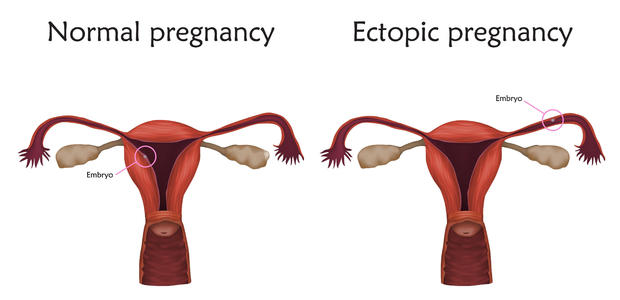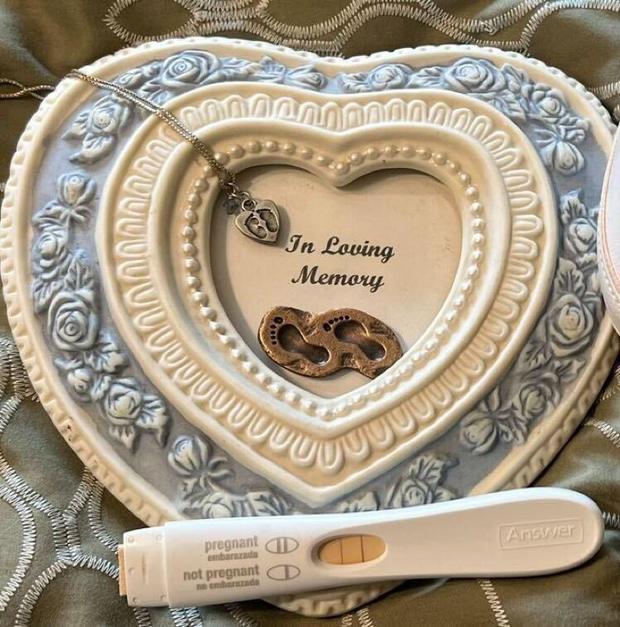
When Sarah was 24, she was a newly single mother of two small children, including one with significant special health needs. Days before Mother’s Day and just a few months after escaping her abusive partner, she doubled over in pain and had to be hospitalized. Within hours, she found out she was at risk of sudden death.
Sarah was unknowingly near the end of her first trimester, but instead of the embryo developing in her uterus, it was developing at the end of her fallopian tube. She had an ectopic pregnancy and her tube was about to rupture.
She needed an immediate abortion. Without one, her doctor said the tube would burst and she would bleed to death.
“I was shocked,” she told CBS News. “…But, you know, if I had not been able to get that, I would have died and my children would have been left with an abusive father who, on top of that, did not know how to take care of those multiple special needs. I have no idea what would have happened to my kids if I died.”
Sarah is one of many who have experienced such pregnancies, and whose life was saved by an abortion procedure.
But the Supreme Court’s decision to overturn Roe v. Wade, the 1973 landmark case that protected the right to an abortion, has created an area of grave unknowns when it comes to medical emergencies such as Sarah’s.
“In my years of being an OB-GYN, I’ve seen things that I didn’t know were medically possible complicate pregnancies,” Dr. Amy Addante told CBS News. “…There’s a lot of other extremes of pathology that can definitely require that a person not be pregnant any more so that they can preserve their own health.”
Dr. Louise Perkins King, an OB-GYN and director of reproductive bioethics at the Harvard Medical School Center for Bioethics, told CBS News that the list of things that can go wrong during a pregnancy “is incredibly long.” She experienced it herself.
When she was pregnant, she developed HELLP syndrome, a severe form of preeclampsia that causes one’s liver to fail, platelet numbers to decrease and spontaneous hemorrhaging. If it’s not treated quickly, it’s also associated with stroke, and even death.
“Pregnancy is dangerous, especially when carried to term,” she said.
Along with ectopic pregnancy and HELLP syndrome, those who are pregnant can also develop hypertension, seizures, diabetes, liver disorders, cardiac disorders, pulmonary (lung) function issues, sepsis and complications with delivery itself. Sometimes, these conditions are life-threatening.
“Pregnancy takes an enormous toll on the body. And because of that toll, every person needs to be able to decide for themselves whether they wish to go forward with all those risks and morbidities,” King said. “Almost every single person will experience something from their pregnancy that will put them at some sort of risk or discomfort.”
Many pregnancies do remain healthy and relatively uncomplicated throughout the full term, Addante said, but complications are all too common — and when they occur, Addante said, “it can be very extreme.” Certain issues, such as ectopic pregnancy, gestational diabetes, preeclampsia and hypertension, also put subsequent pregnancies at risk.
Since the court’s ruling, many women have taken to social media to share their own experiences.
“We were desperate with a baby we had been desperately trying for,” Amanda Huber, the widow of pro wrestler Jon Huber, wrote on Twitter of a pregnancy she had in October 2015. “Something felt off.”
Huber went to the hospital and waited for hours to be seen. When they finally did an ultrasound, she heard the heartbeat for her “peanut.” Then the doctor told her it was an ectopic pregnancy and her tube had ruptured. She was bleeding out.
“I had to end this badly wanted pregnancy. This pregnancy who’s heartbeat I got to hear. A pregnancy that would never ever ever EVER be a f***ing baby,” she wrote. “A pregnancy that would leave my 3-year-old without a mom & my husband a widow.”
She immediately went into emergency surgery. Doctors said if her bleeding hadn’t stopped within the hour, she would have lost her ovary. After a few hours, she would’ve needed a hysterectomy. If she’d waited 12 hours, “I would have been dead.”
A few years later, Huber suffered a miscarriage that her body didn’t expel. The fetal tissues had to be removed. If not, potentially fatal sepsis could develop.
“The moral of this story,” Huber wrote: “Abortion is f***ing healthcare. I shouldn’t have to share my trauma to make it ‘ok.’ I’m sure I’ll hear ‘but your story is the exception’ and I don’t want to hear it. I’m white and wealthy, of course I’m the exception.”
Dr. Addante said that pregnancy complications such as these arise from a myriad of factors, including individual health history and a lack of access to general health care. Systemic issues, such as proximity to care, racial bias and economic status, have long prevented many from accessing the help they need.
Those impacted by these injustices will feel the harm much more intensely than those who have more resources, Addante said.
“[The overturning of Roe] is going to make pregnancy more dangerous,” she said. “We already know that pregnancy in the United States is not as safe as it is in most of the other developed world.”
In 2020, 861 women in the U.S. died while they were pregnant or within 42 days afterwards, according to the Centers for Disease Control and Prevention — a maternal mortality rate of 23.8 deaths per 100,000 live births. The rate for Black women was more than double the national average — 55.3 deaths per 100,000 live births.
And the doctors CBS News spoke with predict these numbers will only get higher.
“Many, many people will die,” King said.
She said the overturning of Roe creates a complicated situation for doctors. Some state laws will only allow abortions when a pregnant person’s life, not just their health, is in danger.
“But how do you define that?” she said. And if a doctor misjudges what the state will allow, they could face legal action.
“Either they’re going to intervene early and face all of the consequences that I described … or they’re going to wait to intervene and perhaps lose a patient, meaning that she will die,” King said.
Medical emergencies aren’t the only concern. Both doctors said the mental health consequences of being forced to complete an unwanted pregnancy can be dire.
They pointed to the well-known Turnaway Study, which spent years tracking the fallout for those who either had or were denied access to an abortion. Those denied abortions were more likely to see an increase in poverty and debt, reported additional health problems, and were more likely to stay in contact with violent partners while raising children alone.
King added that she’s “never met any person” who casually chose to get an abortion. “These families need support. …They don’t need additional legal impositions on their ability to make the right choices for them.”
Seeing the legal tide turn has left both doctors feeling angry and betrayed.
“This should make everybody feel deep outrage and a deep sense of betrayal,” King said. “…As a human being, I have fewer rights if I’m of reproductive age and a person with a uterus to control my body than I would if I were dead.”
Addante said, “It’s a betrayal of my oath.”
“When I became a physician, I took an oath to help people to the best of my ability,” she said. “And now I am having my abilities limited by someone that didn’t take that same oath. … It is a betrayal of the patients who have entrusted me with their care.”
That sense of anger and frustration is also being felt by those who have undergone abortions in the past. Sarah, now 40, has a keepsake box from the pregnancy that threatened her life. Inscribed “In Loving Memory,” it’s filled with pictures the doctor gave her, a pregnancy test and a birthstone necklace.
She’s also still dealing with issues from the ectopic pregnancy, something that she said demonstrates just how much of a health concern pregnancy is — and the risks facing those who may no longer have a choice.
“People like me will die,” she said. “People that have incomplete miscarriages, fetuses that die, things like that — they’re basically sentenced to death because no one’s going to touch them.”



/cdn.vox-cdn.com/uploads/chorus_asset/file/24916158/IMG_2125.jpg)
/cdn.vox-cdn.com/uploads/chorus_asset/file/24759174/hero_about_living_room.png)
/cdn.vox-cdn.com/uploads/chorus_asset/file/25231421/UI___Whimsical_tiger_as_oil_painting.jpg)